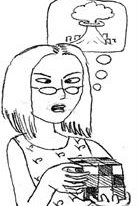OMG PBS stopped fund raising finally, but they have some dumb crap on Katharine Hepburn on now, so I can post--until Antiques Roadshow comes on.
Anyway, I saw the Watchmen yesterday, and I loved it. I don't think I've ever been brought to tears by a comic book movie before--it was THAT good. Most of the goodness was in the writing, though, although I liked the imagery of the movie much more than the comic. The choice of colours in the comic was a bit garish for my taste. I also finished reading the comic. Oh. Excuse me. *Graphic Novel.*
Many people like that they changed the ending of the movie. I did not. I liked the ending of the comic much much better, and here are five reasons why. Spoilers Here but I suppose if you're reading this you've already seen this movie or read the comic, or don't give a crap about getting the end spoiled.
1) It has a giant beached octopus planted in the middle of New York. How bloody awesome is that?
2) In the comic book, Doctor Manhattan leaves earth of his own volition as opposed to being martyred. I realize that he would have left weather or not the final atrocity was attributed to him, but I feel that the story is more open at the end if the reader could imagine that he *could* come back if he wanted. Martyring him imposes a limit on a person who is pretty much a god at the end of the book.
3)The Tales of the Black Freighter comic within the graphic novel, the end of which was juxtaposed over the climax of the main story added a depth of emotion and meaning to the end of the main story, making it more raw and vivid than the end of the movie. Black Freighter is going to be released on its own as an animated feature, but I really felt that without the main story to compliment it, it wasn't that impressive.
4) The background of Adrian Veidt is explained more thoroughly in the comic. He's also a much less sympathetic character. The reader has to give a little more morally to relate to him before grudgingly admitting that he might be right.
5)Because Doctor Manhattan became the scapegoat for the final atrocity at the end of the movie, it becomes harder to believe that the peace between the US and the Soviets is going to last, especially given that in the aftermath of 9/11 where the outpouring of support for the US lasted only a few months. (And then our tool of a president screwed it all up). The giant Octopus is an unknown threat to both the US and the soviets. It gives them no model, assuming Veidt is not discovered, to build future weapons upon. Because Manhattan was a stoolie for the US government and because he was initially american, it's conceivable in the future that his ethnicity could be used as ammo by the Soviets. Because the Americans worked with him, it's conceivable that the Americans could conclude that he was not returning to earth and that the act was a one off "pox on both of your houses" in revenge. Neither party could try to psychoanalyze the octopus.
Monday, March 16, 2009
Subscribe to:
Post Comments (Atom)


2 comments:
Re: missing the squid: it did actually make it into the film, sort of.
Re: black freighter: I understand the DVD release may have a ginormous cut that interleaves the black freighter back into the story--but unless they changed the ending, I'm not sure that's going to have anywhere near the same effect.
Re: psychoanalyzing the octopus, yes, they could.
:-)
Well, the gist of the end of the black freighter was that because he was convinced he was being attacked, this man ended up destroying his hometown and damning himself. The parallel with Adrian and the United States works regardless of the ending.
The sense of fatalism conveyed by the comic is also relative: the Black Freighter had planned his self-destruction from the beginning and there wasn't much he could have done to stop it. In the end, by realizing what he's done and damning himself, he concedes to fate and in doing so removes the threat to the vilage.
Post a Comment